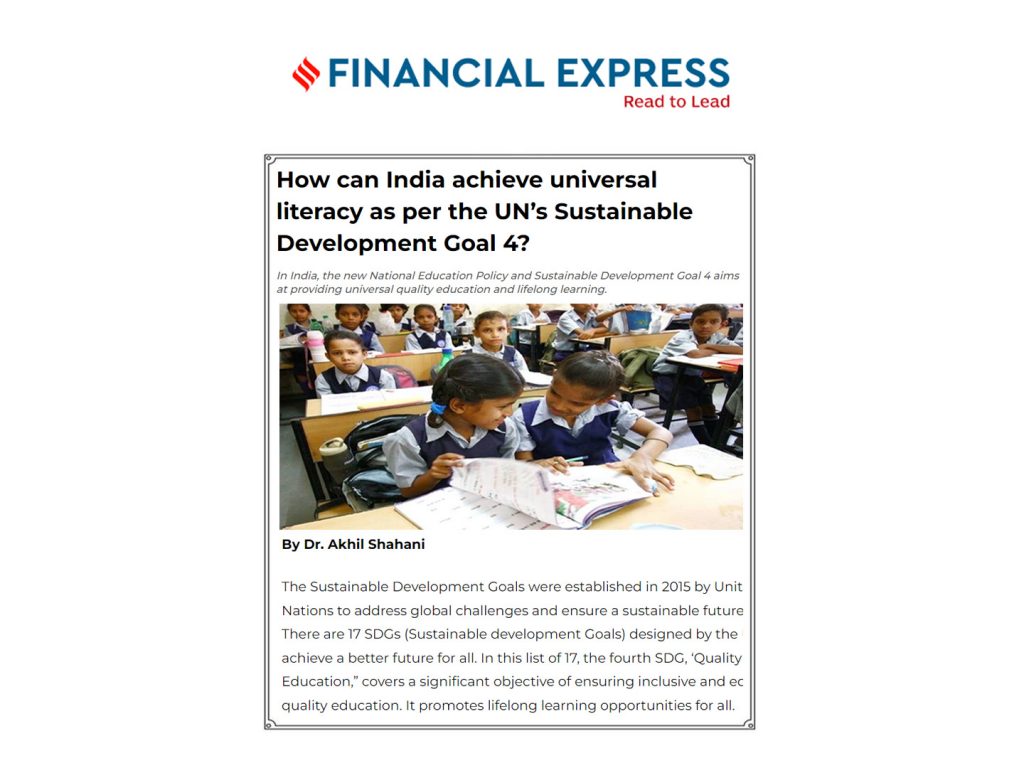Search
How can India achieve universal literacy as per the UN’s Sustainable Development Goal 4?

By Dr. Akhil Shahani
The Sustainable Development Goals were established in 2015 by United Nations to address global challenges and ensure a sustainable future by 2030. There are 17 SDGs (Sustainable development Goals) designed by the UN to achieve a better future for all. In this list of 17, the fourth SDG, ‘Quality Education,” covers a significant objective of ensuring inclusive and equitable quality education. It promotes lifelong learning opportunities for all.
Need and Importance of SDG 4
Attaining quality education is the key factor that can break the cycle of poverty. It plays a vital role in developing a human personality. It renders the mind to build thoughts and broaden its capacity to gain knowledge. Moreover, it constructs self-reliance by enhancing the quality of lifestyle and livelihood. It promotes sustainable development by contributing to the overall success and economic growth. Therefore, to support and accelerate the functioning of the other SDGs, acquiring quality education becomes prime.
In India, the new National Education Policy and Sustainable Development Goal 4 aims at providing universal quality education and lifelong learning.
How can India achieve universal literacy with SDG 4?
India is already playing an essential role in achieving the targets set by SDG 4. Various initiatives and projects are already in place to provide quality education to all. SGD 4 is built on ten goals.
Let’s see how India is achieving these goals with the help of various policies.
Padhe Bharat, Badhe Bharat
As per the Ministry of Education, ‘Padhe Bharat, Badhe Bharat’ is created to enable children to become motivated, independent, and engaged.
Beti bachao, beti padhao
Beti Bachao, Beti Padhao initiative was launched in the year 2015 in Panipat, Haryana. Its main objective is to address various discrimination girls face in society and change the negative mindset related to girls.
The Rashtriya Avishkar Abhiyan
This project was also initiated in 2015 by the former president of India, Late A.P.J Abdul Kalam. It aims to motivate children to learn Science, Mathematics, and Technology from observations and experiments.
Sarva Shiksha Abhiyan
The flagship government scheme, Sarva Shiksha Abhiyan, aims to achieve universal quality education for all Indians and is complemented in this effort by targeted schemes on nutritional support, higher education, and teacher training.
There are many such schemes implemented in India; however, if we need to progress towards SDG 4, we need to examine the key issues that affect the quality of education in India today.
Some of these significant challenges are highlighted below:
Lifelong learning
The employment trends and patterns are constantly changing. Thus, lifelong learning is essential to cope up with the evolving demands of employment.
We need educational policies with a contextual and holistic approach that perceive education as a lifelong process and focuses on educating the youth with technical and vocational skills.
Critical thinking
Critical thinking skills are needed, particularly among our youth, to help them make better decisions, solve problems, and be focused on their goals. Schools, colleges, and other educational institutions must avoid the old rote learning methodology. Students need to understand, analyze and learn various concepts. Students must be encouraged to ask questions, use real-life examples and interact with their peers.
Gender disparity
Investing in the education of girls can have a profound impact on everyone. Educated girls earn higher incomes, have an active role in decision-making, and build a better future for their families.
However, many girls have to drop out of school early because of the widespread gender disparity prevalent in our country. Thus, as children begin to understand the difference each gender plays, it is vital, especially for the teachers, to interact with them and help them understand the importance of gender equality. As simple as using a gender-neutral language can help a lot to maintain gender equality.
Digital technology
Educational processes have radically changed due to the emergence of digital modes. Through the use of smartphones and laptops, learning has become more personal and pervasive. However, while this enhances computer and technological skills, the focus must also be given to basic skills required to build an entrepreneurship mindset amongst students.
Financing education
Government spending on education is reducing while parents spending on education is rising; the quality of education is deteriorating while a majority of the students are dependent on private coaching. Adequate funding from both central and state governments is the need of the hour to provide quality education, especially for adult education.
In India, significant progress has been made towards the achievement of SDG4. Basic literacy skills across the country have improved tremendously, yet bolder schemes and efforts with regards to digital technology and financing education are needed to achieve universal education goals.
Read Full Article: https://www.financialexpress.com/education-2/how-can-india-achieve-universal-literacy-as-per-the-uns-sustainable-development-goal-4/2470535/
